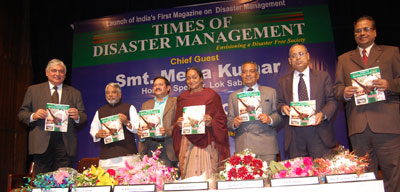 Meira launches India's first magazine on Disaster Management Meira launches India's first magazine on Disaster Management
NEW DELHI, Jan 31: Lok Sabha Speaker Meira Kumar launched India’s first magazine on disaster management, “Times of Disaster Management”, at a function here on Sunday.
She was the Chief Guest at the simple launch ceremony. Several eminent persons, including senior Congress leader Keshav Rao, attended the launch funtion.
Resignation of Andhra MPs over Telangana under consideration
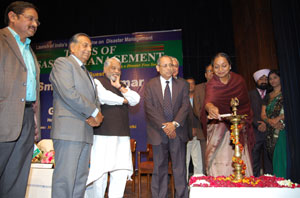 Speaking to journalists on the sidelines of the function, Mrs Kumar said is yet to decide on the resignation of three MPs from Andhra Pradesh who put in their papers over the Telangana issue. Speaking to journalists on the sidelines of the function, Mrs Kumar said is yet to decide on the resignation of three MPs from Andhra Pradesh who put in their papers over the Telangana issue.
“I have got the resignation letters. They are under consideration.”
Three MPs -- Lagadapati Rajagopal (Congress), TRS chief K Chandrasekhar Rao and party MP Vijayashanti -- had sent their resignations to the Lok Sabha Speaker in December last year.
While Mr. Rajagopal resigned in protest against Centre’s decision to form Telangana state, Mr. Rao and Ms. Vijayashanti put in their papers to protest against Home Minister P Chidambaram’s December 23 statement favouring wide-ranging consultations on the issue.
Violence and democracy can't co-exist: Meira
By Deepak Arora
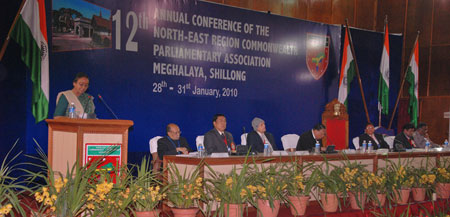 SHILLONG, Jan 29: While denouncing the insurgents in the North-East, Lok Sabha Speaker Meira Kumar has said that violence and democracy cannot co-exist and that all necessary initiatives should be taken to bring back those influenced by the cult of violence into the mainstream of our society. SHILLONG, Jan 29: While denouncing the insurgents in the North-East, Lok Sabha Speaker Meira Kumar has said that violence and democracy cannot co-exist and that all necessary initiatives should be taken to bring back those influenced by the cult of violence into the mainstream of our society.
Inaugurating the 12th North-East Region Commonwealth Parliamentary Association (NERCPA) Conference here on Friday, Mrs Kumar said “we need to take initiatives to bring back those influenced by the cult of violence into the mainstream of our society. Everyone involved has to realise that violence and democracy cannot co-exist."
She said the region, surrounded by five countries, is extremely important to the territorial integrity of the nation.
"It is in recognition of this strategic significance and the special characteristics of its people and their cultures that the framers of our Constitution thought it fit to incorporate special provisions in the Constitution to take care of the specific requirements of this region," said the Speaker.
 Mrs Kumar said that despite the existence of rich natural resources and enormous potential for growth, the North-East is grappling with multifarious problems of underdevelopment, unemployment, backwardness and insurgency. Mrs Kumar said that despite the existence of rich natural resources and enormous potential for growth, the North-East is grappling with multifarious problems of underdevelopment, unemployment, backwardness and insurgency.
“Throughout its post-Independence history, most States in the region have been badly affected by the problem of insurgency in one way or the other – the adverse impact on the overall development of the region varying only in degrees between States in the area,” she added.
Emphasising the need for durable peace and prosperity in the region, She said that the people’s representatives at all levels have to ensure that conditions conducive for accountable, transparent, responsible and responsive governance, eliminating any scope for corruption and mismanagement are created across the region.
“There is a need to empower and energize the various institutions of local self-government like the village panchayats, village councils and the village development boards so as to promote peace and achieve equitable and inclusive growth,” she added.
Referring to transfer of large amount of resources by way of special economic and developmental packages for the region by the Central Government, Mrs Kumar urged the States in the region to keep an unremitting vigil over various programmes and to ensure that the available funds are spent prudently and in the best interest of the people.
This is the first visit to the North-East by Mrs Meira Kumar after assuming office of the Lok Sabha Speaker.
Meira to inaugurate North-East CPA meet
 NEW DELHI, Jan 28: Lok Sabha Speaker Meira Kumar will inaugurate the Twelfth Annual Conference of the North-East Region Commonwealth Parliamentary Association in Shillong on Friday. NEW DELHI, Jan 28: Lok Sabha Speaker Meira Kumar will inaugurate the Twelfth Annual Conference of the North-East Region Commonwealth Parliamentary Association in Shillong on Friday.
On her arrival in Shillong, she was received by Charles Pyngrope, Speaker of the Meghalaya Legislative Assembly and Martin M. Danggo, Minister for Parliamentary Affairs, Meghalaya.
Besides the Lok Sabha Speaker, other dignitaries who will address the various Sessions of the Annual Conference include R.S. Mooshahary, Governor of Meghalaya; Dr. D.D. Lapang, Chief Minister of Meghalaya; K. Rahman Khan, Deputy Chairman, Rajya Sabha; H.A. Halim, Speaker of West Bengal Legislative Assembly; Charles Pyngrope, Speaker of the Meghalaya Legislative Assembly; Tanka Bahadur Rai, Speaker of the Assam Legislative Assembly; Kiyanilie Peseyie, Speaker of Nagaland Legislative Assembly and Martin M. Danggo, Minister for Parliamentary Affairs, Meghalaya.
The two-day Conference will deliberate on the topic, “The Impact of Insurgency activities in the North-east India on Socio-Economic Development and its solution thereof”.
Over the years, the CPA has emerged as a custodian of parliamentary democracy, making remarkable contributions towards democratic consolidation through its member-parliaments. The North-East Region CPA has been contributing greatly in furthering the aims and objectives of the Association by bringing together the members of the region in regular Conferences and meetings.
This is the first visit to the North-East by Smt. Meira Kumar after assuming office of the Lok Sabha Speaker.
Parliamentarians pay floral tributes to Lala Lajpat Rai
By Deepak Arora
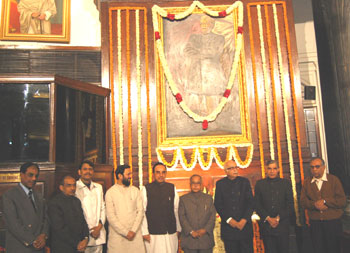 NEW DELHI, Jan 28: Leader of the House in the Lok Sabha and Union Minister of Finance, Pranab Mukherjee, Chairman of the BJP Parliamentary Party, L.K. Advani and Union Minister of Parliamentary Affairs, Pawan Kumar Bansal led the parliamentarians in paying floral tributes to Lala Lajpat Rai in the Central Hall of Parliament House on his birth anniversary today. NEW DELHI, Jan 28: Leader of the House in the Lok Sabha and Union Minister of Finance, Pranab Mukherjee, Chairman of the BJP Parliamentary Party, L.K. Advani and Union Minister of Parliamentary Affairs, Pawan Kumar Bansal led the parliamentarians in paying floral tributes to Lala Lajpat Rai in the Central Hall of Parliament House on his birth anniversary today.
Members of Parliament, former Members of Parliament and other dignitaries attended the function.
A booklet containing the profile of Lala Lajpat Rai, brought out in Hindi and English by the Lok Sabha Secretariat, was presented to the dignitaries.
The portrait of Lala Lajpat Rai was unveiled by the then Prime Minister, Pandit Jawaharlal Nehru, in the Central Hall of Parliament House on 17 November 1956.
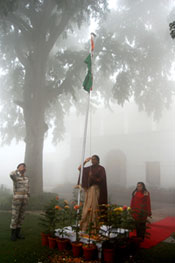 Meira hoists National Flag Meira hoists National Flag
on Republic Day
NEW DELHI, Jan 26: Lok Sabha Speaker Meira Kumar has greeted the citizens on the 60th Anniversary of the Republic of India. sHE also hoisted the National Flag at here official residence here on the occasion of 61st Republic Day.
In her message, Mrs Kumar said, “Republic Day is that occasion in our democracy when we look at our achievements as a nation with pride and satisfaction. On this day, we should rededicate ourselves to the cause of social justice and equality on which our Republic was founded. I urge upon all citizens to reiterate their commitment to make India a prosperous nation.”
MPs pay tribute to Netaji on birth anniversary
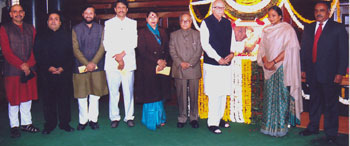 NEW DELHI, Jan 23: Lok Sabha Speaker Meira Kumar, Leader of the House in the Lok Sabha, Pranab Mukherjee and Chairman of the BJP Parliamentary Party L.K. Advani led parliamentarians in paying floral tributes to Netaji Subhas Chandra Bose in the Central Hall of Parliament House on his birth anniversary today. NEW DELHI, Jan 23: Lok Sabha Speaker Meira Kumar, Leader of the House in the Lok Sabha, Pranab Mukherjee and Chairman of the BJP Parliamentary Party L.K. Advani led parliamentarians in paying floral tributes to Netaji Subhas Chandra Bose in the Central Hall of Parliament House on his birth anniversary today.
Mrs Krishna Tirath, Minister of State (Independent Charge) in the Ministry of Women and Child Development, Members of Parliament and former Members of Parliament and others attended the function.
Mr P.D.T. Achary, Secretary-General of Lok Sabha, also paid floral tributes.
A booklet containing the profile of Netaji Subhas Chandra Bose, brought out in Hindi and English by the Lok Sabha Secretariat, was presented to the dignitaries.
The portrait of Netaji Subhas Chandra Bose was unveiled by the then President of India, Dr. N. Sanjiva Reddy, in the Central Hall of Parliament House on January 23, 1978.
Meira calls for strengthening economic relations between India, Mauritius
By Deepak Arora
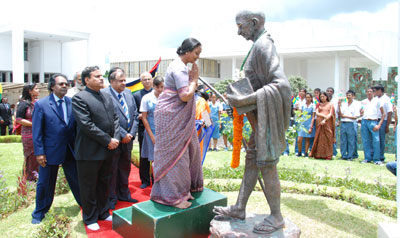 PORT LOUIS, Jan 21: The visiting Indian Parliamentary delegation held a meeting with Paul Raymond Berenger, Leader of Opposition of the National Assembly, here on Wednesday. PORT LOUIS, Jan 21: The visiting Indian Parliamentary delegation held a meeting with Paul Raymond Berenger, Leader of Opposition of the National Assembly, here on Wednesday.
Mr. Berenger said that in the coming elections his party the MMM, would go it alone even if the other two main parties of the centre-left were to unite, which he sensed might happen.
Mrs Kumar expressed her admiration for Mr Berenger’s ideological commitments and also his parliamentary skills she had noted on January 18 when the Indian delegation had sat in the Visitors gallery in the National Assembly when Mr Berenger had put the private notice question to the Prime Minister of Mauritius.
Mr Berenger mentioned that he was happy about the remarkable fact that the Speakers of both the Houses – in India and Pakistan – at the moment were women.
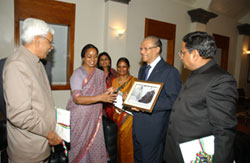 He also disclosed that in case the MMM came to power in the forthcoming election, they would nominate a women as the Speaker of the National Assembly. He also disclosed that in case the MMM came to power in the forthcoming election, they would nominate a women as the Speaker of the National Assembly.
He added that feelings of solidarity with India for which he had originally coined the term ‘umbilical relations’ were unanimously shared across all political parties in Mauritius. In fact, he believed that Mauritius must have special relations with countries of origin for all the communities of Mauritius.
Mrs Kumar wholeheartedly agreed with his view and added that in the coming years not just the emotional but the economic relations should be strengthened.
She could sense that people of Mauritius have the genius of turning what appeared to be irreconcilable differences into points of strength for the nation, a capacity evident in the fact that both the British Parliamentary and French socialist influences in the past had been harnessed for nation building.
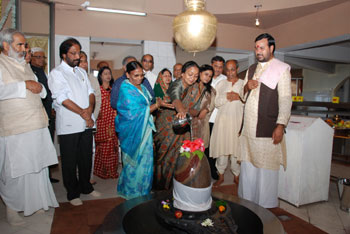 The Indian MPs from constituencies in Bihar, Tamil Nadu and Rajasthan extended their warm invitation for Mr Berenger to visit their respective States. The Indian MPs from constituencies in Bihar, Tamil Nadu and Rajasthan extended their warm invitation for Mr Berenger to visit their respective States.
The delegation visited Ganga Talao and the Le Morne World Heritage Site.
At Le Morne, which is a memorial built to the slaves who often preferred jumping to death from a high hill to the indignities of slavery, Smt Meira Kumar laid a wreath to pay her respects to those who had preferred freedom in their acts of suicide to an inhuman social order.
‘To these slaves, we owe the blessing of freedom that we enjoy today’, she said.
Meira favours setting up of India-Mauritius Friendship Group
By Deepak Arora
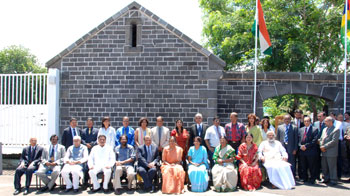 PORT LOUIS, Jan 20: Lok Sabha Speaker Meira Kumar, who is leading a Parliamentary delegation to Mauritius, has welcomed the suggestion that an India-Mauritius friendship group be constituted as early as possible. PORT LOUIS, Jan 20: Lok Sabha Speaker Meira Kumar, who is leading a Parliamentary delegation to Mauritius, has welcomed the suggestion that an India-Mauritius friendship group be constituted as early as possible.
Holding a freewheeling discussion with Mauritius Speaker Rajkeswur Purryag and MPs of the National Assembly, Mrs Kumar agreed that people in both countries were committed to pluralism and democracy
Speaker Rajkeswur Purryag initiated the discussion, saying that Parliament in Mauritius had been instrumental in providing a transparent government, equitable distribution of wealth and assurance of civil rights. Common human values, he said, governed the political destinies of the two countries from different continents.
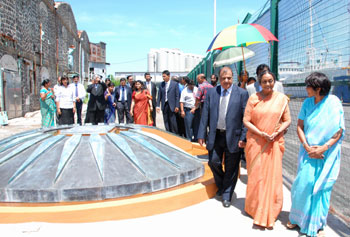 However, despite the two countries following the West-minister model, he was struck by the fact that the standing orders for the National Assembly and Lok Sabha were so different. However, despite the two countries following the West-minister model, he was struck by the fact that the standing orders for the National Assembly and Lok Sabha were so different.
He stressed the fact that you need institutions like Parliament for the smooth transfer of power after elections without which some African countries had shown civil war-like conditions might erupt.
Mrs Meira Kumar agreed that people in both countries were committed to pluralism and democracy and unhesitatingly welcomed the suggestion that an India-Mauritius friendship group be constituted as early as possible.
The Indian delegation learnt about the “best looser system” enshrined in the constitution of Mauritius which provides for four members from minority communities and another four on party-cum-community basis, in Mauritius to be representatives in the National Assembly if they polled the highest percentage of votes but nevertheless lost the elections.
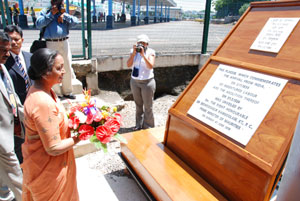 The Indian delegation found it interesting that thsere was no committee system in the National Assembly and there was a full scale debate on the annual budget. They also explained, to their counterparts, aspects of the code of conduct imposed by the Election Commission of India during the elections and the up-to-date position of the law relating to defections in the Indian party system. The Indian delegation found it interesting that thsere was no committee system in the National Assembly and there was a full scale debate on the annual budget. They also explained, to their counterparts, aspects of the code of conduct imposed by the Election Commission of India during the elections and the up-to-date position of the law relating to defections in the Indian party system.
Collectively, it was felt that more intensive exchange of matters related to procedures and practices in the two legislatures would benefit both the countries.
The Indian Parliamentary delegation arrived at Coolie Ghat, renamed Aapravasi Ghat since 1987, in the morning of Tuesday. This memorial to indentured labour, transported to Mauritius from India in 1830s to 1920s, is recognised as a World Heritage site by UNESCO.
The members of the delegation marveled at the courage of the indentured workers who suffered indignities and survived to emerge as the driving force for the development of Mauritius into a flourishing Republic.
Indian Speaker Meira Kumar, who had laid a wreath at the Ghat in November 2007, was nevertheless visibly moved on this second occasion as well. She appreciated the renovation of this historical structure under the Aapravasi Ghat conservation project under the supervision of a team from International Council on Monuments and Sites (ICOMOS)-India.
The Indian delegation also paid a visit to the University of Mauritius in the afternoon and interacted with the UoM Chancellor Sir Ramesh Jeewoolall and senior faculty members.
In her address, Mrs Meira Kumar advocated a perspective that views “today’s youth as tomorrow’s wealth”. Issues related to a request from the Mauritian side to urge institutions of higher learning in India to be more accommodative in offering seats to Mauritian students and join collaborative academic projects with the University of Mauritius were discussed.
The interactive session between the Faculty members and the Indian MPs was lively and constructive.
Terror, climate change dominate Meira's talks with Mauritius leaders
By Deepak Arora
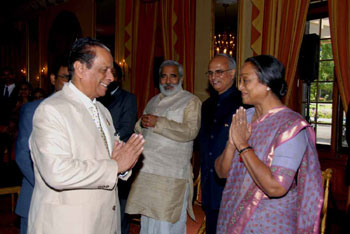 PORT LOUIS, Jan 19 : Lok Sabha Speaker Meira Kumar, who is leading a Parliamentary delegation, held wide ranging talks on issues of mutual concern with the leaders of Mauritius. The Indian MPs discussed issues of mutual concerns related to global terrorism, economic crisis and climate change. PORT LOUIS, Jan 19 : Lok Sabha Speaker Meira Kumar, who is leading a Parliamentary delegation, held wide ranging talks on issues of mutual concern with the leaders of Mauritius. The Indian MPs discussed issues of mutual concerns related to global terrorism, economic crisis and climate change.
The talks were held a congenial atmosphere of free and frank discussions.
Mrs Meira Kumar, leading an Indian parliament delegation to Mauritius, began the day on Tuesday by paying her homage to the memory of the human rights leader, Sir Seewoosagur Ramgoolam at the Botanical Garden at Pamplemousses, Port Louis.
The Speaker of the National Assembly, Mr Rajkeswur Purryag, and Minister of Agro Industry, Food Production and Security Satya Veyash Faugoo were also present on the occasion.
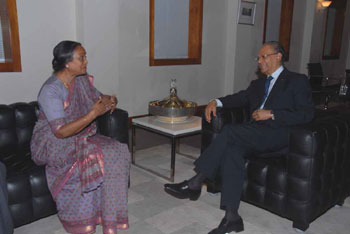 The Indian parliamentary delegation consists of Members of Parliament Dr. Raghuvansh Prasad Singh (RJD), Mrs Ram Devi (BJP), Dr. Mahesh Joshi (INC) from Lok Sabha and Mr Tiruchi Siva (DMK), Mr Shivanand Tiwari (JD-U) of Rajya Sabha, accompanied by Mr P.D. T. Achary, Secretary-General, Lok Sabha and Mr Amitabh Mukhopadhyay, Secretary to the Delegation. The Indian parliamentary delegation consists of Members of Parliament Dr. Raghuvansh Prasad Singh (RJD), Mrs Ram Devi (BJP), Dr. Mahesh Joshi (INC) from Lok Sabha and Mr Tiruchi Siva (DMK), Mr Shivanand Tiwari (JD-U) of Rajya Sabha, accompanied by Mr P.D. T. Achary, Secretary-General, Lok Sabha and Mr Amitabh Mukhopadhyay, Secretary to the Delegation.
The delegation then called on the President of Mauritius, Sir Anerood Jugnauth, at the State House.
The President of Mauritius complimented Mrs Meira Kumar for her firm handling of heated debates in the Lok Sabha. Mrs Kumar conveyed her deep appreciation of the social cohesion and political stability of the Republic of Mauritius.
A mellifluous rendering of ‘Vaishnava Jana To Teine Kahiye, Peer Parayee Jane Re’ rent the air as she garlanded the statue of Mahatma Gandhi, at the MGI, Moka. She inaugurated the Kalpana Exhibition which displays masterpieces of figurative Indian contemporary paintings.
Speaking on the occasion, Chairman of the Institute, Mr. R Dwarka paid rich tributes to the unique assimilative power of Indian art and culture evident over the centuries and exhibited in the Kalpana exhibition.
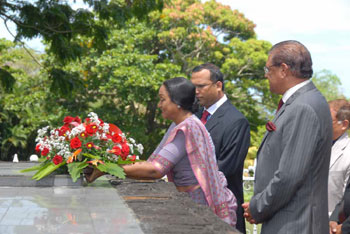 Mrs Kumar said that the Republic of Mauritius represents the values of human rights and dignity which Mahatma Gandhi had so nobly advanced. She also complimented the Institute for the archival work on the genealogies of present day Mauritians of Indian origin whose forefathers had come to the island as indentured labour in the mid 19th century. Mrs Kumar said that the Republic of Mauritius represents the values of human rights and dignity which Mahatma Gandhi had so nobly advanced. She also complimented the Institute for the archival work on the genealogies of present day Mauritians of Indian origin whose forefathers had come to the island as indentured labour in the mid 19th century.
The delegation visited the Cyber City, Ebene which is a project facilitated by the Indian Government and has already become a hub of global IT giants.
The Indian MPs attended a session of the National Assembly and were impressed by the painstaking manner in which the Prime Minister of Mauritius replied to the pointed private notice question put by the Hon’ble Leader of Opposition Mr. Paul Berenger.
Later, at the Prime Minister’s office, mutual concerns related to global terrorism, economic crisis and climate change were discussed by the Indian MPs with Prime Minister Navinchandra Ramgoolam in a congenial atmosphere of free and frank discussions.
Smt. Meira Kumar was particularly touched when Navinchandra Ramgoolam recalled the close bonds that had existed between her father, Babu Jagjivan Ram and Sir Seewoosagur Ramgoolam.
Addressing the gathering of MPs from Mauritius and India at the banquet hosted by the Speaker of the National Assembly of Mauritius, Mrs Meira Kumar accepted the request of the Speaker of the National Assembly to deeper the ties of cooperation between the two countries by more frequent exchange of knowledge and understanding on parliamentary practices and procedures.
She said that this would help the respective Houses to continue to reflect the aspirations of the people in the two countries even in the face of future global challenges.
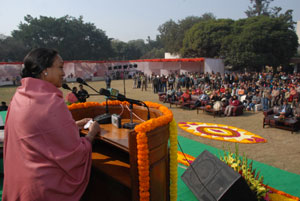 Lok Sabha Secretariat celebrates 81st anniversary Lok Sabha Secretariat celebrates 81st anniversary
NEW DELHI, Jan 16: The Parliament Secretariat, set up in the British era, turned 82 on Saturday and to mark the occasion Speaker Meira Kumar presented awards for meritorious service to officers and staff of the lower house of Indian parliament.
Meira Kumar and Lok Sabha secretary-general P.D.T. Achary addressed staff of the secretariat on the occasion.
“Meritorious awards for the year 2009 were given to officers and staff of the secretariat in various disciplines,” an official statement said.
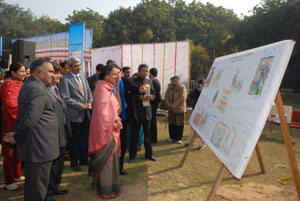 Meira Kumar also gave away prizes to the winners of the drawing competition organised on November 14 by the Parliament Library. Meira Kumar also gave away prizes to the winners of the drawing competition organised on November 14 by the Parliament Library.
Cultural programmes and competitions were organised to mark the Lok Sabha Day.
In the British era, the Indian parliament was known as the Central Legislative Assembly. It was established in 1919 but officially opened in 1921 by the Duke of Connaught and Strathearn. The lower house was later renamed as the Lok Sabha and upper house the Rajya Sabha in 1952 after India became a republic.
Meira Kumar to head Parliamentary delegation to Mauritius
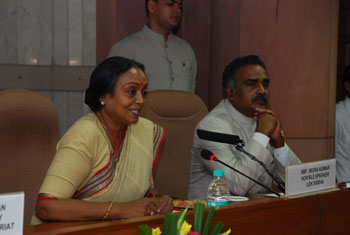 NEW DELHI, Jan 16: Lok Sabha Speaker Meira Kumar is leading a Parliamentary delegation to Mauritius from Sunday where she will hold wide ranging talks on issues of international and bilateral importance with leaders. NEW DELHI, Jan 16: Lok Sabha Speaker Meira Kumar is leading a Parliamentary delegation to Mauritius from Sunday where she will hold wide ranging talks on issues of international and bilateral importance with leaders.
During the visit, the delegation would meet Mauritius President Anerood Jugnauth, Prime Minister Navinchandra Ramgoolam, besides other top leaders, a Lok Sabha Secretariat release said.
The Speaker would also inaugurate an exhibition at Mahatma Gandhi Institute at Moka, it said.
Legislative drafting programme inaugurated
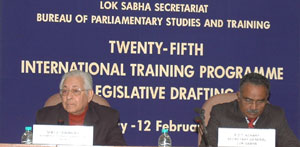 NEW DELHI, Jan 13: Former Attorney-General of India, Mr Soli Sorabjee, inaugurated the 25th International Programme in Legislative Drafting, organized by the Bureau of Parliamentary Studies and Training, Lok Sabha Secretariat. NEW DELHI, Jan 13: Former Attorney-General of India, Mr Soli Sorabjee, inaugurated the 25th International Programme in Legislative Drafting, organized by the Bureau of Parliamentary Studies and Training, Lok Sabha Secretariat.
Mr P.D.T. Achary, Secretary-General, Lok Sabha addressing the participants emphasized that as the law is meant for ordinary citizens, law should be simple and direct.
The Programme is attended by 43 officers from 51 foreign Parliaments including Afghanistan, Argentina Armenia, Bangladesh, Cambodia, Congo, Ethiopia, Fiji, Guatemala, Indonesia, Iraq, Jamaica, Lithuania, Mauritius, Mongolia, Myanmar, Nigeria, Oman, Peru, South Africa, Sri Lanka, Sudan, Suriname, Swaziland, Tajikistan, Tanzania, Thailand, Tunisia, Uganda, Ukraine, Uzbekistan, Zambia, Zimbabwe.
The capacity building Programme which is increasingly gaining popularity is supported by Ministry of External Affairs and Ministry of Finance through Indian Technical Economic Corporation (ITEC), special Commonwealth Africa Assistance Plan (CAAP) and Colombo Plan.
The month long Programme consists of lectures by distinguished faculty members including eminent Parliamentarians and legal and constitutional experts and attachment with Ministry of Law and Justice and practical exercise session, as also attachment with a State Legislature Secretariat.
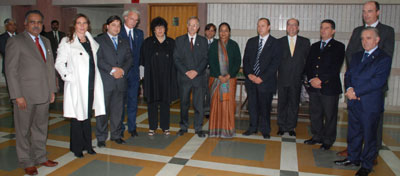 Uruguay Parliamentary delegation calls on Meira Kumar Uruguay Parliamentary delegation calls on Meira Kumar
NEW DELHI, Jan 11: A Parliamentary Delegation from Uruguay led by the President of the House of Representatives of Uruguay, Mr. Roque Arrequi, called on Lok Sabha Speaker Meira Kumar in Parliament Library Building on Monday.
The two sides discussed issues of mutual concern. They also discussed the role of Parliament in strengthening democracy.
Lok Sabha Secretary-General P.D.T. Achary was also present during the talks.
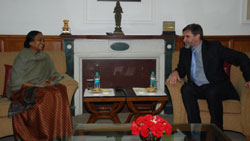 Serbian Ambassador calls on Speaker Meira Kumar Serbian Ambassador calls on Speaker Meira Kumar
NEW DELHI, Jan 11: The Ambassador of the Republic of Serbia, Mr. Jovan Mirilovic, called on Lok Sabha Speaker Mrs Meira Kumar in Parliament House on Monday.
Among other issues, the two also reviewed the Indo-Serbian ties.
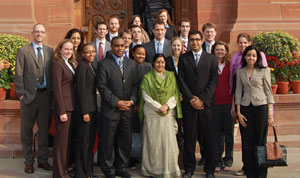 Harvard students call on Opposition leader Sushma Swaraj Harvard students call on Opposition leader Sushma Swaraj
NEW DELHI, Jan 11: A group of students from Harvard University met Leader of Opposition in Lok Sabha Sushma Swaraj in Parliament House on Monday.
The visiting students shared their experiences of India with Mrs Sushma Swaraj.
The Opposition leaders spoke on several subjects including climate change, world affairs and democracy.
Question Hour should be more than one hour: Meira
By Deepak Arora
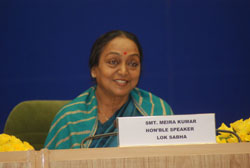 NEW DELHI, Jan 6: Lok Sabha Speaker Meira Kumar is in favour of Question Hour in the House stretching beyond the stipulated one hour to accommodate more questions and thus enabling people to get information on governance. NEW DELHI, Jan 6: Lok Sabha Speaker Meira Kumar is in favour of Question Hour in the House stretching beyond the stipulated one hour to accommodate more questions and thus enabling people to get information on governance.
Briefing newsmen on the deliberations at the Conference of Speakers and Presiding Officers of the Commonwealth, which concluded here on Wednesday, Mrs Kumar said there was an impression that people would like to have more information about governance through the forum of Parliament.
Kumar recalled the New Zealand Speaker saying at the meet that he would at times admit as many as 72 questions during the Question Hour. The Question Hour in New Zealand is not restricted to one hour, she added.
The Canadian Speaker, she said, was in favour of short and precise questions not giving more than 35 seconds for a member to ask a question.
The Speaker said she would consider giving more time for raising questions.
Replying to a question, she said the best way to ensure cost-effective running of Parliament was to run it without interruptions.
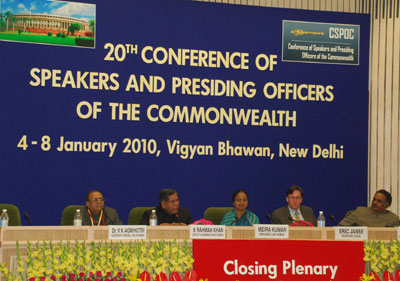 Responding to a question, Mrs Kumar agreed that there was a need to revive and activate the India-Pakistan Parliamentarian Forum, which strengthens bilateral relations at various levels. Responding to a question, Mrs Kumar agreed that there was a need to revive and activate the India-Pakistan Parliamentarian Forum, which strengthens bilateral relations at various levels.
"There was no bilateral meeting with them (Pakistani delegates). There were talks in which we told them that we will definitely revive it (India-Pakistan Parliamentarian Forum) and they also said that they will reciprocate," said Kumar.
On Tuesday, Kumar had met Pakistan's National Assembly Speaker Fehmida Mirza on the sidelines of CSPOC.
Highlighting the advantages of information technology (IT), she strongly advocated the usage of latest technologies for the efficient functioning of the sessions in the parliament and allied provincial assemblies.
"You cannot really avoid IT technology, it should be increased, should be available in the House for the efficiency for the functioning and also for transparency and also for the honourable members to upgrade their knowledge and their database," she said.
She also called for strengthening the Parliamentary institutions to tackle the challenges faced by the polities and societies across the globe.
Around 250 delegates participated in the CSPOC and these included 34 Speakers and presiding officers of elected parliamentary and legislative bodies and allied officials such as Secretary Generals.
She said the delegates had meaningful discussions in the Plenary Sessions, the Workshops and the Regional Caucus Meetings on various issues which have a bearing on the efficient and efficacious functioning of the Commonwealth Parliaments.
"This coming together of the delegates of the Commonwealth fraternity to discuss issues and exchange views has indeed helped us immensely in acquiring a deeper perspective into the problems and challenges faced by us in conducting the parliamentary proceedings as Presiding Officers. There is no doubt that at the end of the Conference, we all feel enriched, and have been greatly benefited from one another’s views, perspectives and insights," said Mrs Kumar in her concuding remarks at the closing plenary session of the conference.
She said the world today is plagued with several grave problems having global ramifications. It is, therefore, necessary that all of us work together collectively and unitedly to find lasting solutions to the problems afflicting our nations and peoples.
The Commonwealth community, spread across all the Continents and the Oceans, encompasses in its fold both the developed and the developing countries. That being so, all global problems invariably find their reflection in the Commonwealth community as well.
In such a scenario, as Presiding Officers of Commonwealth Parliaments, she said it is our duty and responsibility to strive to strengthen our representative institutions to bolster our capacity to confront and to eventually surmount the hurdles before our polities and societies. The Presiding Officers have a pivotal role to play in this regard as they are the custodians of the highest traditions of parliamentary democracy.
"All of us are well aware that people’s faith in democracy rests upon the confidence the common man has in the capacity and effectiveness of the parliamentary system. It thus becomes all the more necessary for all of us to work to secure, sustain and reinforce people’s faith in democratic institutions.
"Let us salute the CSPOC for nurturing and cherishing the values and ideals of parliamentary democracy in the Commonwealth during all these forty years since its inception with utmost devotion and sincerity."
Mrs Kumar said that the New Delhi Conference has further reinforced and reinvigorated the sentinels of parliamentary democracy across the Commonwealth Parliaments.
India, Pak Speakers break the chill
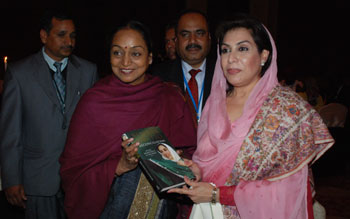 NEW DELHI, Jan 5: The VIP lounge at the high-security Vigyan Bhavan building in the capital today witnessed bonhomie between the Speakers of India and Pakistan, with the two discussing the possibility of inter-parliamentary exchanges between the two nations. NEW DELHI, Jan 5: The VIP lounge at the high-security Vigyan Bhavan building in the capital today witnessed bonhomie between the Speakers of India and Pakistan, with the two discussing the possibility of inter-parliamentary exchanges between the two nations.
India-Pak tension post-26/11 Mumbai terror attacks notwithstanding, both Meira Kumar, Speaker of the Lok Sabha and her Pakistani counterpart Fehmida Mirza talked peace, with Mirza urging upon the former to look at the possibility of instituting a regional women’s parliamentary caucus to further the cause of exchange in the times to come. Pakistan has one such caucus in existence.
Meira, for her part, downplayed references to India and Pakistan as “traditional adversaries”, saying the two were neighbours and wanted to be “good neighbours”. She took the suggestion of Mirza well, saying she would look into the idea of a caucus.
The two today went an extra mile to greet each other, holding hands and smiling for the cameras, which didn’t stop clicking. While Mirza described Meira Kumar as a sister, the latter said she was very excited to have Mirza over for the 20th conference of Speakers of Commonwealth nations, on at the Vigyan Bhavan.
The Pakistan National Assembly Speaker was in fact very vocal about the need for people -to-people contact and said parliamentary diplomacy was very important for peace, progress and stability.
“We need to revive the friendship groups that existed and have more parliamentary exchanges especially among women. Women who comprise 50 per cent of our population can’t be ignored. They are peace-loving and should be brought into the fold,” Mirza said on the sidelines of the conference, adding that there was consensus among all political parties in Pakistan to support the democratic process.
“Dictatorship is the worst of all. In Pakistan, there is support for democracy, which is the best way to govern. We now also have 23 per cent women in our Assembly,” Mirza said, stressing the need for greater political representation of women.
In reference to the challenges of being Speaker in Pakistan, Mirza said the House had been functioning well since she assumed charge. “I am told the House has never seen such smooth sessions,” Pakistan’s first woman speaker said, when asked if her presence had had a calming effect.
Multi-party democracy has worked in India: Manmohan
By Deepak Arora
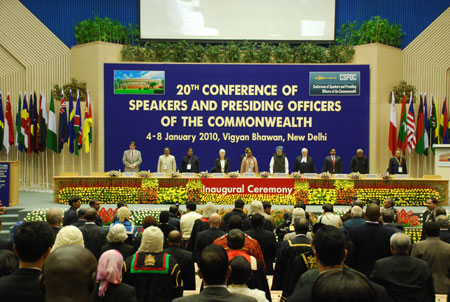 NEW DELHI, Jan 5: Prime Minister Manmohan Singh has said that India's journey to a multi-party democracy has been marked with "stresses and strains" but it has worked. He also made a strong case for a meaningful voice for women in political and developmental processes. NEW DELHI, Jan 5: Prime Minister Manmohan Singh has said that India's journey to a multi-party democracy has been marked with "stresses and strains" but it has worked. He also made a strong case for a meaningful voice for women in political and developmental processes.
Addressing the Conference of Speakers and Presiding Officers of Commonwealth Countries (CSPOC) here on Tuesday, Dr Singh said "India's own tryst with democracy drew its inspiration from our freedom struggle. And so, at a time when most developing countries opted for authoritarian models of government, India chose to be a multi-party democracy."
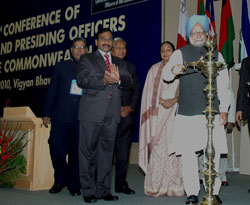 "This journey has not always been smooth. There have been stresses and strains. This is inevitable in a diverse and plural society that India is. Despite these often noisy political contestations, India has remained as a functioning multi-party democracy. Democracy has strengthened our polity and our institutions." "This journey has not always been smooth. There have been stresses and strains. This is inevitable in a diverse and plural society that India is. Despite these often noisy political contestations, India has remained as a functioning multi-party democracy. Democracy has strengthened our polity and our institutions."
The 20th CSPOC is being attended by 50 Speakers and Presiding Officers from Commonwealth Parliaments and 34 Speakers and Presiding Officers from the State Legislatures of India. Apart from this, 34 Clerks/Secretaries-General of Commonwealth Parliaments are attending the Conference. Besides, 35 accompanying persons and 36 spouses have also gathered in New Delhi.
Lok Sabha Speaker Meira Kumar is Chairperson of the Conference.
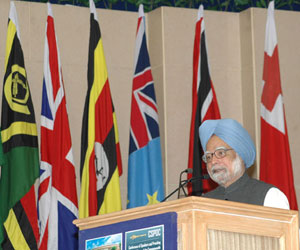 The Prime Minister said India's experiment in trying to achieve economic salvation within the framework of a pluralistic, democratic polity that respects individual freedom and the rule of law had profound implications for the world. The Prime Minister said India's experiment in trying to achieve economic salvation within the framework of a pluralistic, democratic polity that respects individual freedom and the rule of law had profound implications for the world.
"If our way of governing can succeed and if we are able to banish poverty from our land in a generation, it will convincingly answer the question of whether democracy can sustain rapid development and growth."
Dr Singh said that throughout the world “there is a generational shift in politics as there is in business and other fields. In India, seventy per cent of the population is below the age of 35, and they are voting in large numbers. We must act to meet their expectations. It is also imperative that women are given a more meaningful voice in our political and development processes. Our representative bodies should think of ways to marshal the energy and the impatience of the young and the vast latent capabilities of our women.
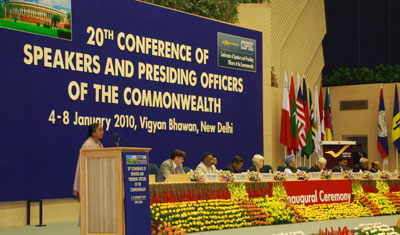 Hailing Meira Kumar for her "iron fist beneath a velvet voice", Dr Singh said the task of running parliament smoothly and giving due voice to all sections had become complex and challenging. Hailing Meira Kumar for her "iron fist beneath a velvet voice", Dr Singh said the task of running parliament smoothly and giving due voice to all sections had become complex and challenging.
"In India, I am proud to say that, with reservation in our local bodies, we have today more than a million elected representatives who are women. They are deepening our democracy and enriching our development processes."
Making a specific reference to the issue of climate change, Dr Singh said that it is the small states and indeed the developing world in general that is bearing the brunt of a problem they did little to create.
“Issues relating to climate change require a collective and cooperative approach based on the principle of common but differentiated responsibility.”
In this regard, he called for a greater sense of fairness and justice in the global approaches towards dealing with the problem of climate change.
The Prime Minister pointed out that the role of Presiding Officers has come into sharp focus as the task of running Parliament smoothly, giving due representation and voice to all sections, has become more complex and challenging. The aspirations of the smaller parties may often be anchored in narrower considerations but they carry great weight for their constituents. In the end, democracy must respond to these everyday concerns of the common man and Parliament should be the forum to articulate and address them.
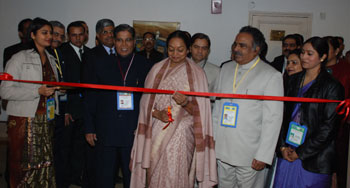 Dr Singh said that the growth of extremist ideologies is threatening civilized existence. The proponents of such ideologies are challenging the tenets of democracy and representational politics by resorting to intimidation, terror and other manifestations of intolerance. Dr Singh said that the growth of extremist ideologies is threatening civilized existence. The proponents of such ideologies are challenging the tenets of democracy and representational politics by resorting to intimidation, terror and other manifestations of intolerance.
“We should not and cannot give any quarter to such forces. At the same time, we should look at ways and means by which such forces can be eliminated without undermining our democratic foundations.”
Dr Singh said that this will require sustained international effort and cooperation and expressed confidence that the CSPOC deliberations will give new insights on how we can tackle this grave menace.
Earlier, welcome the distinguish gathering, the Lok Sabha Speaker and Chairperson of the Conference, Mrs Meira Kumar, said that our Parliament has been playing a pivotal role in promoting the ideals of democracy, human dignity and tolerance as enshrined in our Constitution.
As an instrument of social change, she said “our Parliament has enacted a large number of people-centric legislations to address the concerns and problems of various segments of our pluralistic society.”
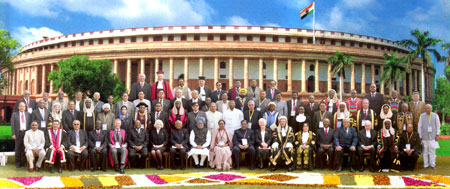 During the past six decades since Independence, she said parliamentary democracy has taken deep roots in our country. Rules have been laid down and healthy traditions have been established by men of wisdom. Our traditions have been shaped by our experiences in the Freedom Struggle and therefore our democracy has a time-tested, imperishable core. The undiminishing commitment to democracy shown by the people of India constitutes this core, she emphasized. During the past six decades since Independence, she said parliamentary democracy has taken deep roots in our country. Rules have been laid down and healthy traditions have been established by men of wisdom. Our traditions have been shaped by our experiences in the Freedom Struggle and therefore our democracy has a time-tested, imperishable core. The undiminishing commitment to democracy shown by the people of India constitutes this core, she emphasized.
Addressing the distinguished gathering, the Deputy Speaker of the House of Commons, United Kingdom, Sylvia Lloyd Heal, congratulated Mrs Meira Kumar for being unanimously elected as the first woman Speaker of the Lok Sabha, which is indeed an achievement.
Proposing a Vote of Thanks, the Speaker of the House of Commons of Canada, Peter Milliken, on behalf of all the participants, thanked the Speaker of Lok Sabha for hosting the Conference and expressed his gratitude to the Prime Minister, Dr. Manmohan Singh, for his inspiring inaugural address.
Before the formal inauguration of the Conference, the Lok Sabha Speaker inaugurated an Exhibition titled “Parliamentary Democracy in India: An Overview” at the pre-function area on the first floor of the Vigyan Bhawan.
The Exhibition has been put up by the Parliamentary Museum and Archives of the Lok Sabha Secretariat in collaboration with the Directorate of Advertising & Visual Publicity (DAVP).
PM releases postage stamp
 NEW DELHI, Jan 5: The Prime Minister Dr. Manmohan Singh, released on Tuesday a commemorative postage stamp dedicated to the 20th Conference of Speakers and Presiding Officers of the Commonwealth at a function in Vigyan Bhavan. NEW DELHI, Jan 5: The Prime Minister Dr. Manmohan Singh, released on Tuesday a commemorative postage stamp dedicated to the 20th Conference of Speakers and Presiding Officers of the Commonwealth at a function in Vigyan Bhavan.
The Union Minister of Communications & IT A. Raja presented the stamp issued by the Department of Posts to the Prime Minister for release at this august gathering.
The Conference was inaugurated by Dr. Manmohan Singh. Speakers and Presiding officers of the Commonwealth, Members of Parliament, Diplomats, Academicians and other eminent persons attended the Conference.
Information technology to help deepen democracy
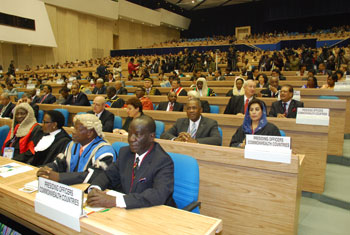 NEW DELHI, Jan 5: The 20th Conference of Commonwealth Speakers and Presiding Officers (CSPOC) met in the Opening Plenary on Tuesday. The Lok Sabha Speaker and Chairperson of the Conference, Mrs Meira Kumar, chaired the Plenary which adopted the draft agenda of the Conference. NEW DELHI, Jan 5: The 20th Conference of Commonwealth Speakers and Presiding Officers (CSPOC) met in the Opening Plenary on Tuesday. The Lok Sabha Speaker and Chairperson of the Conference, Mrs Meira Kumar, chaired the Plenary which adopted the draft agenda of the Conference.
The Plenary elected two Vice-Chairpersons for the Conference, namely, K. Rahman Khan, Deputy Chairman, Rajya Sabha, India, and Baroness Hayman, Lord Speaker, House of Lords, UK. In the same Session, Rwanda was accepted as a member of the CSPOC which was discussed and recommended by the Standing Committee in its meeting held on January 4.
In the afternoon, the Conference deliberated in three different Workshops. The Workshop on the Role of Speaker in the Administration of Parliament was chaired by Falemoe Leiatana Tolofuaivalelei, Speaker of the Legislative Assembly of Samoa.
Making a presentation on the theme, the Speaker of Lok Sabha, Mrs Meira Kumar, said that the Speaker’s role in the administration of the Legislature forms the bedrock of parliamentary functioning. The administration of Parliament connotes the orderly conduct of the proceedings of the House and the measures to facilitate that process so as to make it a cost-effective Legislature and an efficient administrative machinery.
Highlighting the role of the Business Advisory Committee (BAC) presided over by the Speaker and with members representing major political groupings in Parliament as its constituents, Mrs Kumar pointed out that the BAC recommends the business to be transacted by the House during the Session. As Chairperson of the BAC, the Speaker also meets Leaders of Parties and Groups represented in Parliament fairly regularly to evolve a consensus for the orderly conduct of the House.
Referring to the ‘Zero Hour’, the Speaker said it was an Indian innovation and referred to the specific initiatives taken to finetune the ‘Zero Hour’ which facilitated 20 matters being taken up every day, out of which 5 matters of urgent national and international importance, as decided by the Chair, were taken up immediately after the Question Hour.
The remaining admitted matters were taken up after 6 pm or at the end of the regular business of the House.
The Speaker referred to several measures taken in the Indian Parliament to keep a close and constant monitoring of the expenditure involved in parliamentary activities. Clear guidelines have been issued as part of austerity measures during official tours and visits within the country and abroad.
As regards the specific administrative role of the Speaker, Mrs Kumar said that the Constitution provided for a separate Secretariat for each House with administrative and financial autonomy.
Dwelling on the budget of the Parliament, she said that the Secretariat of Lok Sabha was primarily responsible for the preparation of the budget estimates of the House. Such financial autonomy, coupled with other administrative autonomy, she observed, ensured that the Secretariat functions independent of the Executive.
The Speaker referred to the path-breaking legislations enacted by the Parliament, such as the Freedom of Information Act in 2002 and subsequently the Right to Information Act in 2005. The Register of Declaration of Assets and Liabilities of Elected Members was also now subject to RTI. The 24-hour Lok Sabha Television Channel, she said, extended the Visitor’s Gallery to the drawing rooms of citizens across the country.
The presentation by the Speaker of Lok Sabha was followed by interactive discussions in which the following participated: Amusaa K. Mwanamwambwa, Speaker of the National Assembly of Zambia; Elizabeth F.Y. Renner, Speaker of the National Assembly of the Gambia; Rt. Hon. Justice Joyce Adeline Bamford-Addo, Speaker of the Parliament of Ghana; Sylvia Llyod Heal, Deputy Speaker of the House of Commons, United Kingdom; and Kenneth Otiato Marende, Speaker of the National Assembly of Kenya.
The Workshop on “The Use of Technology in the Parliamentary Context” was chaired by Abdullah Tarmugi, Speaker of the Parliament of Singapore.
Making the main presentation on the theme, the Deputy Chairman of Rajya Sabha, K. Rahman Khan, highlighted the inescapability of the use of Information and Communication Technology(ICT) in furthering and deepening democracy.
In this regard, he pointed out that information flow within the Government, between citizens and Government, and among citizens and civil society is crucial for building a successful democratic society. Innovation is urgently needed to find out ways to engage the public to interact with multiple agencies, departments and representatives.
Given the highly demanding job of people’s representatives, it becomes imperative for them to remain ever updated and connected with the people. Technology should be used in the parliamentary sphere so as to ensure more transparency, better effectiveness and more civil society engagement in the processes of governance.
There is an imperative to program democracy into the cyberspace, so as to realize the promise and potential of digital network communications, because new technologies have to be used as a resource for the benefit of parliamentarians and the people alike to strengthen democratic ideals, he said.
In his presentation, Michael C. Birt, Bailiff of Jersey, highlighted the difficulties and disadvantages involved in an indiscriminate use of technology in Parliaments. If Members are allowed the use of gadgets like Blackberries and Laptops, the Chamber would be more like a call centre than a debating forum! Besides, it causes a great deal of distraction to other Members, he emphasized.
After this presentation, a lively discussion took place in which Stephen Charles Rodan SHK of the Isle of Man; Sylvia Lloyd Heal of UK; Bruce Craig Scott of Australia and Ms. Heather Bradley of Canada participated in what turned out to be a very interesting interaction on the advantages and disadvantages of technology in the parliamentary context based on practical experiences.
Everybody agreed that while there is no escape from technology, the sanctity of the Chamber as a debating forum must not be compromised by the indiscriminate use of technology.
The Workshop on The Speaker’s Role as a Mediator was chaired by the Hari Narayen Ramkarran, Speaker, National Assembly of Guyana.
Leading the discussion on the subject, Dr. Lockwood Smith, Speaker, House of Representatives, New Zealand, observed that for ensuring the smooth functioning of the House, in New Zealand, they have established a Business Committee, which has representation of every party. It discusses several issues, among others, on procedural matters, which helps to arrive at an agreement about how best to deal with the business of the House; this practice avoids wastage of time of the House.
Recognizing the importance of interaction between the Legislature and the Executive and the resultant need of the efficient use of Question time, he stated that he has effectively curbed the tendency of Ministers to make long speeches, evading the much sought-after answers.
He also observed that he believes in the principle of using a light-handed approach with clear boundaries, as far as the maintenance of the conventions and courtesies to be observed in the House is concerned.
Dr. Fehmida Mirza, Speaker, National Assembly, Pakistan, who was the second presenter at the Workshop, observed that the role of the Speaker as a Mediator has effectively matured over time to become pivotal for the smooth functioning of established parliamentary democracies. This evolving role is even more critical for the survival of nascent democracies where the parliamentary institutions may still be in the formative phase.
However, in view of the unwavering impartiality and absolute neutrality expected from the Chair, their role often becomes much more diversified and multi-dimensional than envisioned in the written code.
She felt that the office of the Speaker can still play a far more dynamic mediatory role in times of crisis. Such a symbol of a nation’s freedom can surely be an asset in seeking sustainable solutions to the disputes between nations as well.
In conclusion, she opined ‘As fellow Speakers, we must all speak the language of our people, which is the same everywhere – the language of peace’.
The presentations were followed by participation by Pono Pearsoa Patson Moatlhodi, Deputy Speaker, Parliament of Botswana; Mninwa Mahlangu, Chairperson, National Council of Provinces, South Africa, Dr. Theo-Ben Gurirab, Speaker, National Assembly, Namibia; Rajkeswus Purryag, Speaker, National Assembly, Mauritius; Alvin Smith, Speaker, National Assembly, The Bahamas; Ike Ekweremadu, Deputy President, Senate of Nigeria; Mtlhoi Motsamai, Speaker, Senate of Lesotho; Henry Fostes Chimuntau Banda, Speaker, Parliament of Malawi; Dr. Louis Galea, Speaker, House of Representatives, Malta; and Edward Kiwanuka Ssekandi, Speaker, Parliament of Uganda.
After the Workshops concluded, various Regional Caucus Meetings were held in Vigyan Bhawan.
PM to inaugurate Commonwealth Speakers’ meet
By Deepak Arora
NEW DELHI, Jan 3: Indian Prime Minister Manmohan Singh will inaugurate the 20th Conference of Speakers and Presiding Officers of the Commonwealth (CSPOC) here on Tuesday. The Prime Minister will also release a Commemorative Stamp on the occasion.
This is for the third time that the Conference of Speakers and Presiding Officers of the Commonwealth is being hosted by our Parliament. India had earlier hosted this Conference in 1971 and 1986.
As many as 50 Speakers and Presiding Officers from 42 Parliaments are attending the Conference. Besides, 34 Clerks/Secretaries-General of Commonwealth Parliaments will also be attending the Conference.
In addition to Speakers/Presiding Officers/Clerks/Secretaries-General, there will be 36 accompanying persons and 36 spouses. Apart from Speakers and Presiding Officers from the Commonwealth Parliaments, 34 Speakers and Presiding Officers of State Legislatures of India will also attend the Conference.
The Standing Committee of the CSPOC will meet on Monday under the Chairpersonship of the Speaker Meira Kumar.
The welcome address will be delivered by the Speaker in her capacity as the Chairperson of the Conference.
Prior to the Inaugural Function on January 5, the Speaker of Lok Sabha will inaugurate an exhibition on “Parliamentary Democracy in India: An Overview” at the Prefunction Area in Vigyan Bhawan. The Exhibition is being put up by the Parliamentary Museum and Archives of the Lok Sabha Secretariat and the DAVP.
The Conference will discuss three important issues, viz. (i) The Speaker’s role as a mediator; (ii) The use of technology in the parliamentary context; and (iii) The role of Speaker in the administration of Parliament.
The CSPOC brings together the Speakers and Presiding Officers of the National Parliaments of independent sovereign states of the Commonwealth.
The CSPOC was created in 1969 on the initiative of the then Speaker of the House of Commons of Canada, Lucien Lamourent. Since its inception, Canada has provided CSPOC with the Secretariat to support its activities.
The Conference is an independent group and has no formal affiliation with the Commonwealth Parliamentary Association, the Commonwealth Secretariat or the Commonwealth Heads of Government. The CSPOC operates on a two-year cycle, holding Conference of the full membership every two years, usually early in January and a meeting of the Standing Committee at the same time in the intervening year.
The aims of the Conference are the maintenance, fostering and encouragement of the impartiality and fairness of Speakers and Presiding Officers of Parliaments, the promotion of knowledge and understanding of parliamentary democracy in its various forms and the development of parliamentary institutions.
|

 Meira launches India's first magazine on Disaster Management
Meira launches India's first magazine on Disaster Management Speaking to journalists on the sidelines of the function, Mrs Kumar said is yet to decide on the resignation of three MPs from Andhra Pradesh who put in their papers over the Telangana issue.
Speaking to journalists on the sidelines of the function, Mrs Kumar said is yet to decide on the resignation of three MPs from Andhra Pradesh who put in their papers over the Telangana issue. SHILLONG, Jan 29: While denouncing the insurgents in the North-East, Lok Sabha Speaker Meira Kumar has said that violence and democracy cannot co-exist and that all necessary initiatives should be taken to bring back those influenced by the cult of violence into the mainstream of our society.
SHILLONG, Jan 29: While denouncing the insurgents in the North-East, Lok Sabha Speaker Meira Kumar has said that violence and democracy cannot co-exist and that all necessary initiatives should be taken to bring back those influenced by the cult of violence into the mainstream of our society.  Mrs Kumar said that despite the existence of rich natural resources and enormous potential for growth, the North-East is grappling with multifarious problems of underdevelopment, unemployment, backwardness and insurgency.
Mrs Kumar said that despite the existence of rich natural resources and enormous potential for growth, the North-East is grappling with multifarious problems of underdevelopment, unemployment, backwardness and insurgency.  NEW DELHI, Jan 28: Lok Sabha Speaker Meira Kumar will inaugurate the Twelfth Annual Conference of the North-East Region Commonwealth Parliamentary Association in Shillong on Friday.
NEW DELHI, Jan 28: Lok Sabha Speaker Meira Kumar will inaugurate the Twelfth Annual Conference of the North-East Region Commonwealth Parliamentary Association in Shillong on Friday. NEW DELHI, Jan 28: Leader of the House in the Lok Sabha and Union Minister of Finance, Pranab Mukherjee, Chairman of the BJP Parliamentary Party, L.K. Advani and Union Minister of Parliamentary Affairs, Pawan Kumar Bansal led the parliamentarians in paying floral tributes to Lala Lajpat Rai in the Central Hall of Parliament House on his birth anniversary today.
NEW DELHI, Jan 28: Leader of the House in the Lok Sabha and Union Minister of Finance, Pranab Mukherjee, Chairman of the BJP Parliamentary Party, L.K. Advani and Union Minister of Parliamentary Affairs, Pawan Kumar Bansal led the parliamentarians in paying floral tributes to Lala Lajpat Rai in the Central Hall of Parliament House on his birth anniversary today. Meira hoists National Flag
Meira hoists National Flag  NEW DELHI, Jan 23: Lok Sabha Speaker Meira Kumar, Leader of the House in the Lok Sabha, Pranab Mukherjee and Chairman of the BJP Parliamentary Party L.K. Advani led parliamentarians in paying floral tributes to Netaji Subhas Chandra Bose in the Central Hall of Parliament House on his birth anniversary today.
NEW DELHI, Jan 23: Lok Sabha Speaker Meira Kumar, Leader of the House in the Lok Sabha, Pranab Mukherjee and Chairman of the BJP Parliamentary Party L.K. Advani led parliamentarians in paying floral tributes to Netaji Subhas Chandra Bose in the Central Hall of Parliament House on his birth anniversary today. PORT LOUIS, Jan 21: The visiting Indian Parliamentary delegation held a meeting with Paul Raymond Berenger, Leader of Opposition of the National Assembly, here on Wednesday.
PORT LOUIS, Jan 21: The visiting Indian Parliamentary delegation held a meeting with Paul Raymond Berenger, Leader of Opposition of the National Assembly, here on Wednesday.  He also disclosed that in case the MMM came to power in the forthcoming election, they would nominate a women as the Speaker of the National Assembly.
He also disclosed that in case the MMM came to power in the forthcoming election, they would nominate a women as the Speaker of the National Assembly.  The Indian MPs from constituencies in Bihar, Tamil Nadu and Rajasthan extended their warm invitation for Mr Berenger to visit their respective States.
The Indian MPs from constituencies in Bihar, Tamil Nadu and Rajasthan extended their warm invitation for Mr Berenger to visit their respective States.  PORT LOUIS, Jan 20: Lok Sabha Speaker Meira Kumar, who is leading a Parliamentary delegation to Mauritius, has welcomed the suggestion that an India-Mauritius friendship group be constituted as early as possible.
PORT LOUIS, Jan 20: Lok Sabha Speaker Meira Kumar, who is leading a Parliamentary delegation to Mauritius, has welcomed the suggestion that an India-Mauritius friendship group be constituted as early as possible. However, despite the two countries following the West-minister model, he was struck by the fact that the standing orders for the National Assembly and Lok Sabha were so different.
However, despite the two countries following the West-minister model, he was struck by the fact that the standing orders for the National Assembly and Lok Sabha were so different.  The Indian delegation found it interesting that thsere was no committee system in the National Assembly and there was a full scale debate on the annual budget. They also explained, to their counterparts, aspects of the code of conduct imposed by the Election Commission of India during the elections and the up-to-date position of the law relating to defections in the Indian party system.
The Indian delegation found it interesting that thsere was no committee system in the National Assembly and there was a full scale debate on the annual budget. They also explained, to their counterparts, aspects of the code of conduct imposed by the Election Commission of India during the elections and the up-to-date position of the law relating to defections in the Indian party system.  PORT LOUIS, Jan 19 : Lok Sabha Speaker Meira Kumar, who is leading a Parliamentary delegation, held wide ranging talks on issues of mutual concern with the leaders of Mauritius. The Indian MPs discussed issues of mutual concerns related to global terrorism, economic crisis and climate change.
PORT LOUIS, Jan 19 : Lok Sabha Speaker Meira Kumar, who is leading a Parliamentary delegation, held wide ranging talks on issues of mutual concern with the leaders of Mauritius. The Indian MPs discussed issues of mutual concerns related to global terrorism, economic crisis and climate change. The Indian parliamentary delegation consists of Members of Parliament Dr. Raghuvansh Prasad Singh (RJD), Mrs Ram Devi (BJP), Dr. Mahesh Joshi (INC) from Lok Sabha and Mr Tiruchi Siva (DMK), Mr Shivanand Tiwari (JD-U) of Rajya Sabha, accompanied by Mr P.D. T. Achary, Secretary-General, Lok Sabha and Mr Amitabh Mukhopadhyay, Secretary to the Delegation.
The Indian parliamentary delegation consists of Members of Parliament Dr. Raghuvansh Prasad Singh (RJD), Mrs Ram Devi (BJP), Dr. Mahesh Joshi (INC) from Lok Sabha and Mr Tiruchi Siva (DMK), Mr Shivanand Tiwari (JD-U) of Rajya Sabha, accompanied by Mr P.D. T. Achary, Secretary-General, Lok Sabha and Mr Amitabh Mukhopadhyay, Secretary to the Delegation. Mrs Kumar said that the Republic of Mauritius represents the values of human rights and dignity which Mahatma Gandhi had so nobly advanced. She also complimented the Institute for the archival work on the genealogies of present day Mauritians of Indian origin whose forefathers had come to the island as indentured labour in the mid 19th century.
Mrs Kumar said that the Republic of Mauritius represents the values of human rights and dignity which Mahatma Gandhi had so nobly advanced. She also complimented the Institute for the archival work on the genealogies of present day Mauritians of Indian origin whose forefathers had come to the island as indentured labour in the mid 19th century. Lok Sabha Secretariat celebrates 81st anniversary
Lok Sabha Secretariat celebrates 81st anniversary Meira Kumar also gave away prizes to the winners of the drawing competition organised on November 14 by the Parliament Library.
Meira Kumar also gave away prizes to the winners of the drawing competition organised on November 14 by the Parliament Library.  NEW DELHI, Jan 16: Lok Sabha Speaker Meira Kumar is leading a Parliamentary delegation to Mauritius from Sunday where she will hold wide ranging talks on issues of international and bilateral importance with leaders.
NEW DELHI, Jan 16: Lok Sabha Speaker Meira Kumar is leading a Parliamentary delegation to Mauritius from Sunday where she will hold wide ranging talks on issues of international and bilateral importance with leaders. NEW DELHI, Jan 13: Former Attorney-General of India, Mr Soli Sorabjee, inaugurated the 25th International Programme in Legislative Drafting, organized by the Bureau of Parliamentary Studies and Training, Lok Sabha Secretariat.
NEW DELHI, Jan 13: Former Attorney-General of India, Mr Soli Sorabjee, inaugurated the 25th International Programme in Legislative Drafting, organized by the Bureau of Parliamentary Studies and Training, Lok Sabha Secretariat.  Uruguay Parliamentary delegation calls on Meira Kumar
Uruguay Parliamentary delegation calls on Meira Kumar Serbian Ambassador calls on Speaker Meira Kumar
Serbian Ambassador calls on Speaker Meira Kumar Harvard students call on Opposition leader Sushma Swaraj
Harvard students call on Opposition leader Sushma Swaraj NEW DELHI, Jan 6: Lok Sabha Speaker Meira Kumar is in favour of Question Hour in the House stretching beyond the stipulated one hour to accommodate more questions and thus enabling people to get information on governance.
NEW DELHI, Jan 6: Lok Sabha Speaker Meira Kumar is in favour of Question Hour in the House stretching beyond the stipulated one hour to accommodate more questions and thus enabling people to get information on governance.  Responding to a question, Mrs Kumar agreed that there was a need to revive and activate the India-Pakistan Parliamentarian Forum, which strengthens bilateral relations at various levels.
Responding to a question, Mrs Kumar agreed that there was a need to revive and activate the India-Pakistan Parliamentarian Forum, which strengthens bilateral relations at various levels. NEW DELHI, Jan 5: The VIP lounge at the high-security Vigyan Bhavan building in the capital today witnessed bonhomie between the Speakers of India and Pakistan, with the two discussing the possibility of inter-parliamentary exchanges between the two nations.
NEW DELHI, Jan 5: The VIP lounge at the high-security Vigyan Bhavan building in the capital today witnessed bonhomie between the Speakers of India and Pakistan, with the two discussing the possibility of inter-parliamentary exchanges between the two nations.  NEW DELHI, Jan 5: Prime Minister Manmohan Singh has said that India's journey to a multi-party democracy has been marked with "stresses and strains" but it has worked. He also made a strong case for a meaningful voice for women in political and developmental processes.
NEW DELHI, Jan 5: Prime Minister Manmohan Singh has said that India's journey to a multi-party democracy has been marked with "stresses and strains" but it has worked. He also made a strong case for a meaningful voice for women in political and developmental processes.  "This journey has not always been smooth. There have been stresses and strains. This is inevitable in a diverse and plural society that India is. Despite these often noisy political contestations, India has remained as a functioning multi-party democracy. Democracy has strengthened our polity and our institutions."
"This journey has not always been smooth. There have been stresses and strains. This is inevitable in a diverse and plural society that India is. Despite these often noisy political contestations, India has remained as a functioning multi-party democracy. Democracy has strengthened our polity and our institutions."  The Prime Minister said India's experiment in trying to achieve economic salvation within the framework of a pluralistic, democratic polity that respects individual freedom and the rule of law had profound implications for the world.
The Prime Minister said India's experiment in trying to achieve economic salvation within the framework of a pluralistic, democratic polity that respects individual freedom and the rule of law had profound implications for the world.  Hailing Meira Kumar for her "iron fist beneath a velvet voice", Dr Singh said the task of running parliament smoothly and giving due voice to all sections had become complex and challenging.
Hailing Meira Kumar for her "iron fist beneath a velvet voice", Dr Singh said the task of running parliament smoothly and giving due voice to all sections had become complex and challenging.  Dr Singh said that the growth of extremist ideologies is threatening civilized existence. The proponents of such ideologies are challenging the tenets of democracy and representational politics by resorting to intimidation, terror and other manifestations of intolerance.
Dr Singh said that the growth of extremist ideologies is threatening civilized existence. The proponents of such ideologies are challenging the tenets of democracy and representational politics by resorting to intimidation, terror and other manifestations of intolerance.  During the past six decades since Independence, she said parliamentary democracy has taken deep roots in our country. Rules have been laid down and healthy traditions have been established by men of wisdom. Our traditions have been shaped by our experiences in the Freedom Struggle and therefore our democracy has a time-tested, imperishable core. The undiminishing commitment to democracy shown by the people of India constitutes this core, she emphasized.
During the past six decades since Independence, she said parliamentary democracy has taken deep roots in our country. Rules have been laid down and healthy traditions have been established by men of wisdom. Our traditions have been shaped by our experiences in the Freedom Struggle and therefore our democracy has a time-tested, imperishable core. The undiminishing commitment to democracy shown by the people of India constitutes this core, she emphasized.  NEW DELHI, Jan 5: The Prime Minister Dr. Manmohan Singh, released on Tuesday a commemorative postage stamp dedicated to the 20th Conference of Speakers and Presiding Officers of the Commonwealth at a function in Vigyan Bhavan.
NEW DELHI, Jan 5: The Prime Minister Dr. Manmohan Singh, released on Tuesday a commemorative postage stamp dedicated to the 20th Conference of Speakers and Presiding Officers of the Commonwealth at a function in Vigyan Bhavan.  NEW DELHI, Jan 5: The 20th Conference of Commonwealth Speakers and Presiding Officers (CSPOC) met in the Opening Plenary on Tuesday. The Lok Sabha Speaker and Chairperson of the Conference, Mrs Meira Kumar, chaired the Plenary which adopted the draft agenda of the Conference.
NEW DELHI, Jan 5: The 20th Conference of Commonwealth Speakers and Presiding Officers (CSPOC) met in the Opening Plenary on Tuesday. The Lok Sabha Speaker and Chairperson of the Conference, Mrs Meira Kumar, chaired the Plenary which adopted the draft agenda of the Conference. 